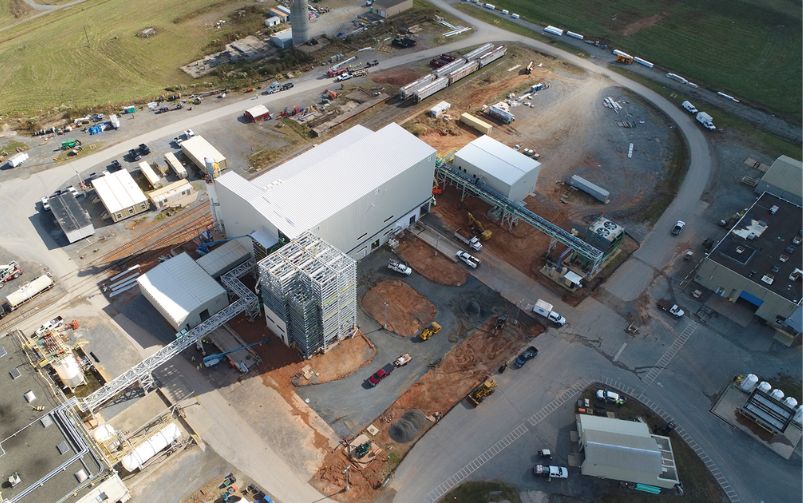(Left to right) Luc Sirois, Denise Johnson, Louis-Olivier Roy, Louise Grondin, Carl Weatherell and Angelina Mehta at Tuesday's plenary panel discussion.
Innovation is the key to decarbonization, said Luc Sirois, chief innovation officer at Conseil de l'innovation du Québec, in his keynote on the second day of the 2023 CIM Convention on May 2.
“We will thrive through innovation, and innovation is more than just startups; it’s more than Silicon Valley,” Sirois said.
Sirois urged attendees to act and make innovation happen at their own companies, stating that it drives wealth and social impact in Canada, and that innovation cannot happen without collaboration.
“Sitting together is not enough,” he said. “It’s about connecting. Because as a nation, we face a dire challenge. We face the challenge of productivity… We must create the wealth equal to our potential, equal to our knowledge, equal to our research, equal to what we are capable of, because the wealth we create will come from our creativity; our ideas.”
Canada is lagging behind other high-income countries in terms of productivity and investment growth, based on data from the Organisation for Economic Co-operation and Development (OECD). Minister of Finance Chrystia Freeland referred to this challenge when she tabled the budget on April 7, 2022, describing productivity and innovation as “the Achilles heel of the Canadian economy.”
“Canadians are the best-educated people in the OECD,” Freeland said in her budget speech. “Our scientists win Nobel prizes, and our cities are outshining Silicon Valley in creating high-paying technology jobs. But we are falling behind when it comes to economic productivity… This is a well-known Canadian problem—and an insidious one.”
Sirois stated this fact is not acceptable and improving productivity is critical to the country’s future. “We are a nation of creators, of builders…this is why collaboration matters, why we must find new ways to drive impact," he said.
The plenary panel discussion following the keynote echoed these sentiments, with the group agreeing that mining companies must look at decarbonization as an industry challenge and bring not only employees but also competitors together as collaborators.
Moderated by Angelina Mehta, general manager of joint ventures at Rio Tinto Aluminium, the panel included Sirois; Carl Weatherell, executive director and CEO at the Canadian Mining Innovation Council (CMIC); Louise Grondin, a retired executive formerly with Agnico Eagle Mines; Louis-Olivier Roy, director of business development at Optel Group; and Denise Johnson, group president, resource industries at Caterpillar Inc.
“Collaboration is an absolute necessity, especially in the context of supply chain traceability, in the event of bringing more sustainable supply chains,” Roy said. “We need people to get together, understand how they can work together and ultimately help decarbonize projects.”
Grondin stated that working together allows people to learn from others’ mistakes and builds trust that anything is possible. “You don't want to reinvent the wheel every time,” she said.
The panellists noted that since the race to decarbonization involves bold goals for improvement over a very short period of time, besides collaboration, there must also be a willingness—and permission—to fail.
Sirois referenced Canada’s favourite national pastime sport, hockey, stating it is important to keep shooting even when you miss the net, and nurture a culture that allows free thinking and experimentation to thrive.
“The real courage is to let the kids play,” he said. He described that companies are capable of keeping key performance indicators (KPIs) front of mind while still allowing employees to have the freedom to work on new ideas and projects.
Weatherell added that many innovations from big tech companies like Apple, Google and Blackberry are a result of side projects, where employees spend a percentage of their time at work “just playing,” i.e., working on personal projects that could potentially benefit the company.
The panellists reiterated that while it is important to give employees freedom, partnerships with other companies are crucial too. Johnson stated it is key to co-develop technology with competitors that will benefit the entire industry, because siloed thinking won’t address decarbonization.
Sirois encouraged attendees to connect with other people in the room to have a positive impact on the industry.
“I hope that these connections will transform the industry, will materialize into real projects, will materialize into innovation initiatives, will materialize into decarbonization projects, and that we will all make a difference for the nation,” he said.
“We need to decarbonize, let’s get on with it,” Grondin summed up in her final words on the panel.




